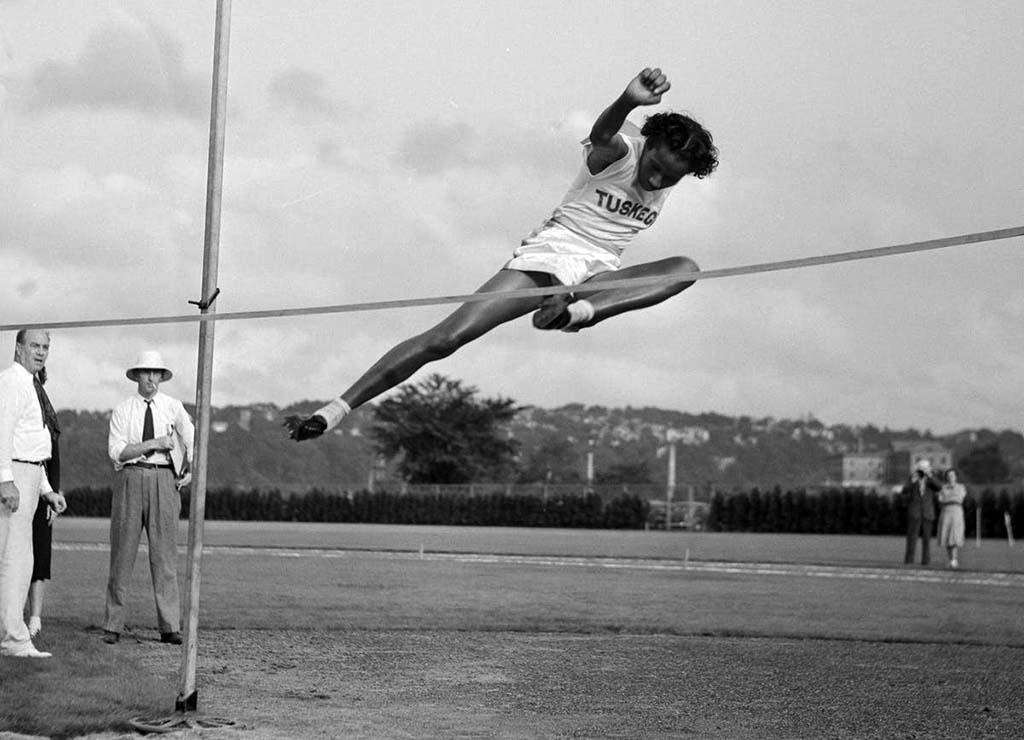
With the Summer Olympic Games rapidly approaching this summer, the best of the United States’ track and field athletes will take their marks at Stade de France in hopes of supplementing the 335 gold medals won across all track and field events. That legacy of dominance is inextricably linked with the African American identity. Pioneers like Jesse Owens, Carl Lewis and Allyson Felix redefined the sport through their blazing speed on the track. Owens and Lewis also set records in the pit as some of the most impressive long jumpers ever. However, often forgotten in that conversation is American high jumper Alice Coachman. As the first Black woman to ever win a gold medal, her legacy is a display of both American perseverance — and hypocrisy.
From the very beginning, Coachman received little support in her athletic career. Growing up in Albany, Ga. amidst the Great Depression meant athletics automatically took a backseat to work and school. She worked alongside her family to pick cotton, plums and pecans. Jim Crow-era segregation laws relegated her first track and field education to running on the dirt paths and through the fields of Albany. Still, Coachman quickly figured out that she was incredibly fast through playing softball and baseball with the local boys. Her father disapproved of her inclination towards these “unladylike” activities, but her aunt, Carrie Spry and Coachman’s fifth-grade teacher, Cora Bailey, both encouraged Coachman to keep running. It paid off — she trained with the Tuskegee Institute track team as a high school sophomore. Coachman eventually finished high school at Tuskegee before graduating and going on to become a dual-sport athlete (basketball and track) for the school’s collegiate division. She ended up winning national championships in the 50 m, 100 m relay and 400 m relay while winning another three national titles for the Tuskegee basketball team. However, her true calling was the high jump.
Between 1939 and 1948, Coachman won nine straight national titles in the high jump. A clear candidate to represent the U.S. at the Olympics, she was not able to compete at either the 1940 or 1944 games due to World War II. When the 1948 games came around, Coachman unfortunately suffered a back injury right before the qualifying trials. It made her hesitant to compete, but she overcame her hesitation and qualified with a new U.S. high jump record in the trials.
Her dominance went global on an August afternoon in Wembley Stadium. On her first try, she set the track world ablaze with a record-breaking 5’6 1/8” jump despite suffering from the same back injury that affected her in the qualifier. As King George VI of Britain put a gold medal around her neck, her place among the pantheon of American track and field should have been secure. However, upon returning home, she experienced the same sort of two-faced treatment that plagued many Black athletes of her time. People were so proud of her accomplishment that they declared an “Alice Coachman Day” in Georgia and organized a 175-mile motorcade in her honor from Atlanta to her hometown of Albany.
Yet, once Coachman returned home, the event fell victim to the all-too-familiar segregation laws. White and Black townsfolk sat in separate sections as the mayor of Albany, J.W. Smith, praised Coachman for her accomplishment. Still, he refused to shake her hand. Coachman was even forced to leave her own celebration by way of a side door. In an interview with NPR, Coachman later recounted that “to come back home … and you can’t even get a handshake from the mayor? Wasn’t a good feeling.”
She stepped away from competition at the age of 24 and went on to earn her degree in home economics from Albany State University, becoming a teacher and coach. Despite her relative obscurity today, she was named to both the National Track and Field Hall of Fame in 1975 and the U.S. Olympic &
Paralympic Hall of Fame in 2004.
Objectively, Alice Coachman’s story is one of progress. The historical nature of a southern Georgia town celebrating a Black woman on the front page of their newspaper and throwing her a parade during the Jim Crow era should not be discounted.
However, it is equally true that her story is a reminder of the dehumanization of African American athletes. Neither their incredible talent nor their perseverance could bridge the carefully maintained barrier between them and white America. When Albany’s mayor refused to shake her hand, it was made abundantly clear to Coachman that she would be celebrated as a symbol rather than a person.
It is important that American fans are aware of both the awe-inspiring and disappointing parts of Coachman’s story. Being aware of the history and people behind the medals and competitions only enhances the appreciation for what they achieve. Therefore, while watching the Olympics this summer and cheering on the athletes, remember the leaps Alice Coachman made for the nation.
The post Alice Coachman lifted our nation to new heights appeared first on Technique.
